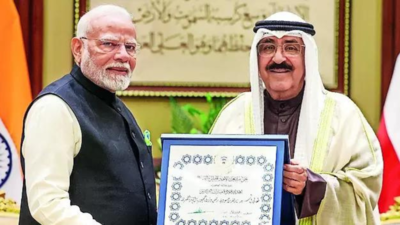Narendra Modi's visit to Kuwait, the first by an Indian Prime Minister in 43 years, was marked by the two sides signing a significant agreement to boost defence cooperation and also elevate relations to a strategic partnership . The defence agreement is in line with efforts by Indian govt in recent times to boost security and defence cooperation with Gulf nations. "The agreement will institutionalise bilateral cooperation in the area of defence," said the Indian govt, adding that key areas of cooperation will include joint military exercises, training of defence personnel, coastal defence, maritime safety, joint development and production of defence equipment.
Importantly for India, Kuwait joined India in unequivocally condemning terrorism in all its forms and manifestations, including cross-border terrorism and called for disrupting terrorism financing networks and safe havens, and dismantling of terror infrastructure. Expressing appreciation of their ongoing bilateral cooperation in security, both sides agreed to enhance cooperation in counter-terrorism operations , information and intelligence sharing and, among other things, to strengthen cooperation in law enforcement, anti-money laundering, drug-trafficking and other crimes. Modi held bilateral talks with Kuwait PM Sheikh Ahmad Al-Abdullah Al-Ahmad Al-Sabah, looking to finalise a roadmap to bolster strategic partnership in political, trade, investment, energy, defence and security ties.
India, Kuwait believed to have di.



















